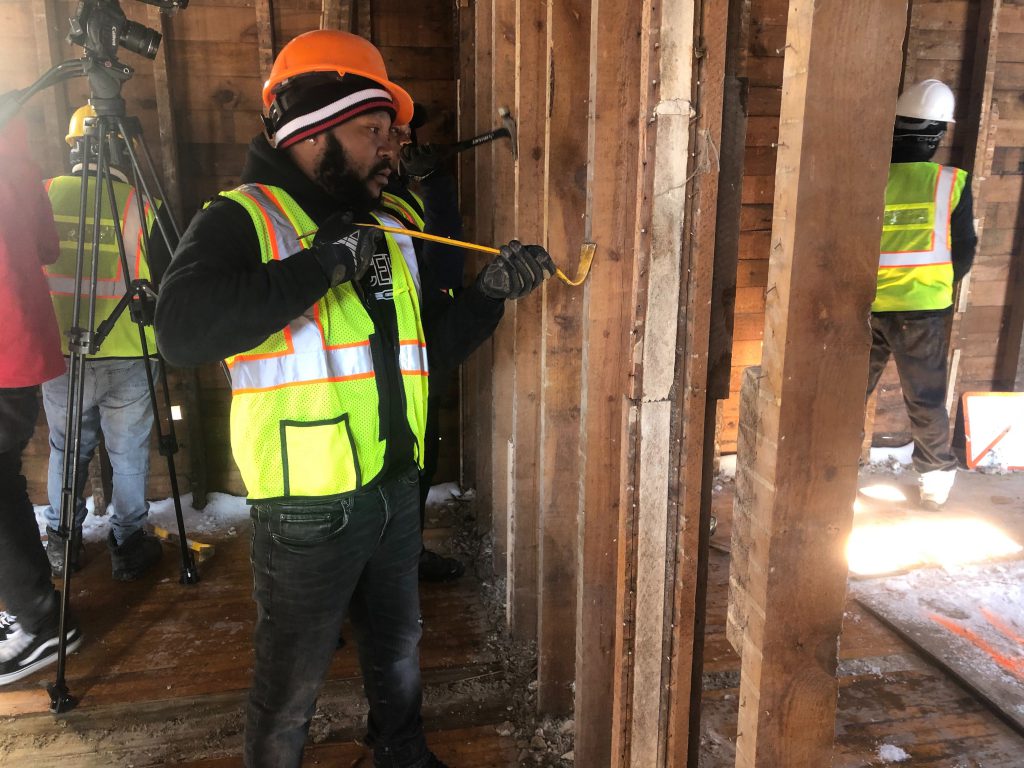Bauman Wins Preservation Funding By Sacrificing Deconstruction Funds
Did he open the door to the council taking the remainder of the deconstruction fund?

A crew member from Spencer Renovation & Construction demonstrates deconstruction work in 2019. Photo by Jeramey Jannene.
It took four months, but Alderman Robert Bauman secured $300,000 in funding for a housing preservation effort. In doing so, he might have opened the door to losing a long-protected funding pool intended to seed a program that would provide a more environmentally friendly, job-intensive vacant home removal method.
In October, Bauman attempted to divert $150,000 of the $3.3 million that Mayor Cavalier Johnson allocated for demolishing vacant homes to the Housing Infrastructure Preservation Fund (HIPF).
The preservation fund is used to provide forgivable loans to buyers of city-owned homes in need of substantial renovation. Created in 2009, roughly $3 million has been invested in approximately 50 homes, yielding approximately $6 million in assessed property value. Bauman, meanwhile, has accused the mayor’s “Raze and Revive” strategy of excelling at razing, but failing to revive much.
In November, alderman’s colleagues rejected his budget amendment out of stated concerns of slowing down housing demolitions. But he kept at the idea.
In December, he tried to transfer $300,000 from a capital account associated with the long-stalled deconstruction program, but ran into red tape that the funding would violate a state statute by moving funding from the Department of Neighborhood Services (DNS) to the Department of City Development.
“Because they are two different departments, we need to do this convoluted gymnastics move here where we suspend spending authority in one department and one account and then authorize contingent borrowing in a different capital account in a different department, with the net effect being the same in terms of the fiscal impact on the city,” said the alderman when the Finance & Personnel Committee considered the revised legal framework on Jan. 16.
For years, Bauman has protected the deconstruction funding. Now he’s raiding it. He told the finance committee he is aware of no plan to use the funding, of which approximately $850,000 of a 2019, $1.2 million initial allocation remains.
First proposed in 2018, the initial deconstruction plan called for the city to prime the marketplace by deconstructing its own homes piece by piece, instead of demolishing them. Private owners razing their properties would also be required to deconstruct homes built before 1930. The vision called for more jobs to be created versus mechanical demolition while also swapping the cost of landfill tipping with a new revenue stream from selling salvaged lumber and other materials.
But city contracting requirements have been routinely cited as the reason the program can’t get off the ground. Many council members have opposed removing the requirements, for fear it would extend to other city projects.
The first contractor started in 2019 with great fanfare, then was terminated, and ultimately sued for nonperformance. The second spent months with paperwork delays, then took more than a year to complete a 10-home contract. Additional contracts were opened for bid in two consecutive years, but the winning firms didn’t finalize the contract in either case. A potential late 2023 deal with Northcott Neighborhood House, viewed as a potential savior to the contracting requirement issue, didn’t come to fruition. A request for bids was issued in 2024, but no bids were advanced to the council for approval.
“The department had a hard time getting out of the gate with this program,” said Bauman of DNS.
What Happens To The Remaining Funding?
Bauman’s move may have opened Pandora’s box with regard to draining the rest of the deconstruction program, which stands at approximately $550,000.
Alderwoman Sharlen P. Moore asked questions about using the funding for conventional demolition. “Blight elimination, when I think of the words, why wouldn’t we use some of those dollars to go to our raze orders?” she asked. Moore, like the majority of the council, was not in office during the 2018 and 2019 debates.
The council will need to act at some point. “The money doesn’t just sit there forever, there will be a point when the money would lapse,” said budget director Nik Kovac, who backed the program’s creation when he was an alderman.
The full council unanimously endorsed Bauman’s $300,000 transfer on Jan. 21. Ald. DiAndre Jackson co-sponsored Bauman’s proposal.
Legislation Link - Urban Milwaukee members see direct links to legislation mentioned in this article. Join today
If you think stories like this are important, become a member of Urban Milwaukee and help support real, independent journalism. Plus you get some cool added benefits.
More about the Deconstruction Ordinance
- Bauman Wins Preservation Funding By Sacrificing Deconstruction Funds - Jeramey Jannene - Feb 7th, 2025
- Amendment Would Shift Money From Demolishing Homes To Fixing Them - Jeramey Jannene - Oct 23rd, 2024
- Tentative Deal Would Salvage Milwaukee’s Deconstruction Program - Jeramey Jannene - Oct 25th, 2023
- Eyes on Milwaukee: Deconstruction Ordinance Again Suspended - Jeramey Jannene - Mar 17th, 2023
- Eyes on Milwaukee: Deconstruction Program Suspended Again - Jeramey Jannene - Feb 14th, 2022
- Eyes on Milwaukee: Deconstruction Policy Remains, Well… Deconstructed - Jeramey Jannene - Dec 13th, 2021
- Eyes on Milwaukee: New Deconstruction Firm Makes Progress - Jeramey Jannene - Feb 2nd, 2021
- Eyes on Milwaukee: City Hires New Deconstruction Contractor - Jeramey Jannene - Oct 12th, 2020
- Eyes on Milwaukee: City Moves to Fire Deconstruction Firm - Jeramey Jannene - Mar 2nd, 2020
- Eyes on Milwaukee: Deconstruction Contractor Delaying Work - Jeramey Jannene - Jan 27th, 2020
Read more about Deconstruction Ordinance here
Political Contributions Tracker
Displaying political contributions between people mentioned in this story. Learn more.
- October 23, 2024 - DiAndre Jackson received $75 from Sharlen P. Moore
- March 4, 2016 - Cavalier Johnson received $35 from Sharlen P. Moore
- February 20, 2016 - Cavalier Johnson received $250 from Robert Bauman
- May 7, 2015 - Nik Kovac received $10 from Cavalier Johnson





















